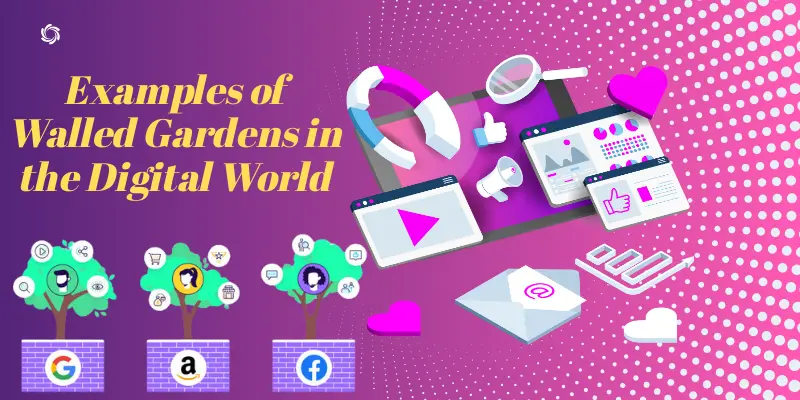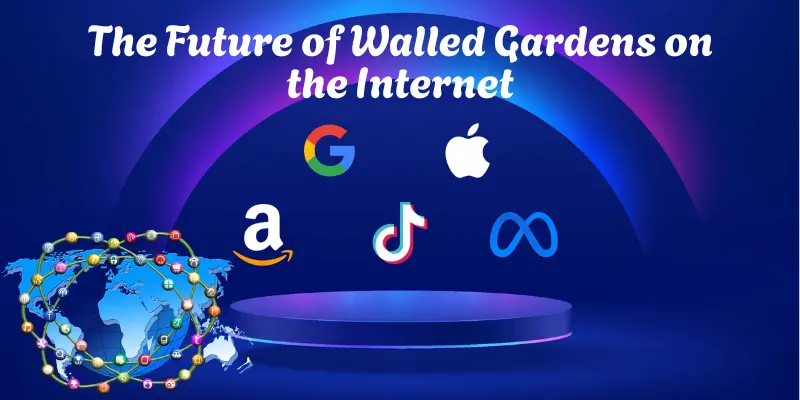Internet Walled Garden – Advantages, Challenges and Future
Published: 22/04/2025
An Internet Walled Garden refers to a closed digital environment where users are limited to content, services, and applications controlled by a single platform or company. This concept is widely seen in major tech companies like Google, Facebook, and Apple, which restrict access to outside resources to keep users within their ecosystem. The purpose of these walled gardens is to provide a controlled, secure, and seamless user experience, but they also limit freedom and competition. How these systems work helps to recognize both the benefits and the challenges they bring to users and businesses alike.
Table of Contents
How Internet Walled Gardens Work
A Walled Garden on the internet is a closed digital space where users are restricted to content and services controlled by a single platform, limiting access to outside resources.

- Closed Ecosystems
- Internet walled gardens create self-contained environments where only approved content and services are accessible, blocking external sites or services.
- Platform Control
- Companies like Google, Facebook, and Apple control what users can access, ensuring that all interactions occur within their ecosystem.
- Data Collection & Personalization
- These platforms collect user data to tailor content, ads, and recommendations, making the user experience more engaging but at the cost of privacy.
- Restricted Access to External Content
- Unlike the open web, where anyone can access content freely, walled gardens limit access to specific apps or websites, creating a curated experience.
- Monetization Through Ads
- Walled gardens generate revenue by controlling advertising within their platforms, giving them the power to serve targeted ads based on user behavior.
- Limited Competition
- By controlling the flow of information and services, these gardens reduce competition from outside companies, keeping users inside their platform.
- Seamless User Experience
- The closed nature ensures smooth integration of services, making it easier for users to navigate and interact without leaving the platform.
Challenges and Criticisms of Walled Gardens
Walled gardens face criticism for restricting user freedom, raising privacy concerns, and stifling competition by controlling content, data, and services within a closed ecosystem.
- Limited User Freedom
- Walled gardens restrict access to outside content, limiting users’ ability to explore the open web and use services of their choice.
- Privacy Concerns
- Since walled gardens control user data, they raise concerns about how personal information is collected, used, and shared without sufficient transparency.
- Monopoly Power
- By controlling both content and advertising, these platforms often stifle competition, making it difficult for smaller businesses to thrive outside the ecosystem.
- Lack of Innovation
- The closed nature of walled gardens may discourage new ideas or technological advances from outside developers, leading to a less diverse internet.
- Data Lock-in
- Users become locked into a single ecosystem, making it hard to switch to alternatives without losing data or compatibility across services.
- Restricting Open Market
- These systems often prioritize their own services over independent providers, leading to a marketplace where options are limited and biased toward the platform’s offerings.
Examples of Walled Gardens in the Digital World
Walled gardens in the digital world refer to platforms like Facebook, Apple, and Google, where user access is restricted to content and services controlled within their closed ecosystems.

- Facebook
- Facebook is a classic example of a walled garden, where users are limited to interacting with content and services that are part of its own platform, controlling everything from posts to advertisements.
- Apple’s App Store
- Apple’s ecosystem operates as a walled garden by restricting apps to the App Store and controlling which apps can be installed on devices, ensuring all services align with Apple’s standards and policies.
- Amazon
- Amazon creates a walled garden around its marketplace, where users access products, recommendations, and advertisements solely within its own platform, limiting external retailers’ visibility.
- Google
- Google operates a walled garden with services like Search, YouTube, and Gmail, which gather user data and deliver personalized experiences while keeping users within their ecosystem.
- Instagram
- As part of the Facebook (Meta) family, Instagram functions as a walled garden by controlling user content, advertising, and interactions exclusively within its own platform.
The Future of Walled Gardens on the Internet
The future of walled gardens on the internet may involve increased regulation, evolving user demands for openness, and a shift towards more decentralized and secure ecosystems.

- Increased Regulation
- As concerns about data privacy grow, governments may introduce stricter regulations to limit the control that walled gardens have over user data and content, promoting a more open internet.
- Evolving User Expectations
- Users may demand more freedom and transparency from digital platforms, leading companies to rethink their walled garden strategies and offer greater access to outside services.
- Integration of AI and Personalization
- Walled gardens will likely use AI to offer even more personalized and immersive experiences, making users more dependent on their ecosystems for daily activities.
- Shift Towards Open Ecosystems
- In response to criticism, some platforms might gradually open up their systems, allowing greater third-party access while still maintaining some level of control over the user experience.
- Rise of Decentralized Alternatives
- New technologies, such as blockchain, could challenge the walled garden model, offering decentralized platforms where users have more control over their data and interactions.
- Focus on User Privacy and Security
- As privacy concerns increase, walled gardens may evolve to prioritize user security, ensuring that personal data is better protected while keeping users within their controlled environments.
- Monopolistic Power Challenges
- Antitrust laws might be strengthened to curb the monopolistic influence of major players in walled gardens, fostering more competition and innovation in the digital world.
Advantages and Disadvantages of Internet Walled Garden
Internet Walled Gardens offer enhanced security and user experience, but they also limit freedom, raise privacy concerns, and reduce competition within the digital ecosystem.
Benefits of Internet Walled Garden
Internet walled gardens offer a controlled and secure environment that enhances user experience through curated content, seamless services, and improved privacy settings.
| Pros of Internet Walled Garden |
|---|
|
Drawbacks of Internet Walled Garden
Internet walled gardens face criticism for limiting user freedom, reducing competition, and raising concerns about privacy and data control.
| Cons of Internet Walled Garden |
|---|
|
Common FAQs about Internet Walled Garden
Common FAQs about Internet Walled Gardens address key concerns about their impact on user freedom, privacy, competition, and the overall digital experience.
A walled garden is a closed environment where access to content and services is controlled by a single platform, limiting interaction with external sites or services.
They provide a seamless, curated experience but restrict access to external content and limit users’ freedom to explore the open internet.
To create a controlled, secure environment where user data can be managed effectively, and to monetize services through advertising.
No, walled gardens typically restrict access to third-party content or services, ensuring that all interactions happen within their ecosystem.
Platforms in walled gardens often collect large amounts of user data, which may raise concerns about data privacy and misuse of personal information.
By controlling access to services and content, they reduce competition from outside businesses, making it harder for new companies to compete.
It can be difficult due to the “lock-in effect,” where users become dependent on the ecosystem, losing compatibility and data when trying to switch to another platform.
Conclusion
While Internet Walled Gardens offer enhanced security, seamless user experiences, and controlled environments, they come with significant trade-offs. These platforms limit user freedom, raise privacy concerns, and stifle competition by creating closed ecosystems. As technology evolves and users demand more open and transparent systems, the future of walled gardens may shift towards more inclusive and decentralized alternatives. The balance between control and freedom will determine how these digital landscapes evolve, impacting both users and businesses alike in the years to come.

- Be Respectful
- Stay Relevant
- Stay Positive
- True Feedback
- Encourage Discussion
- Avoid Spamming
- No Fake News
- Don't Copy-Paste
- No Personal Attacks

- Be Respectful
- Stay Relevant
- Stay Positive
- True Feedback
- Encourage Discussion
- Avoid Spamming
- No Fake News
- Don't Copy-Paste
- No Personal Attacks





